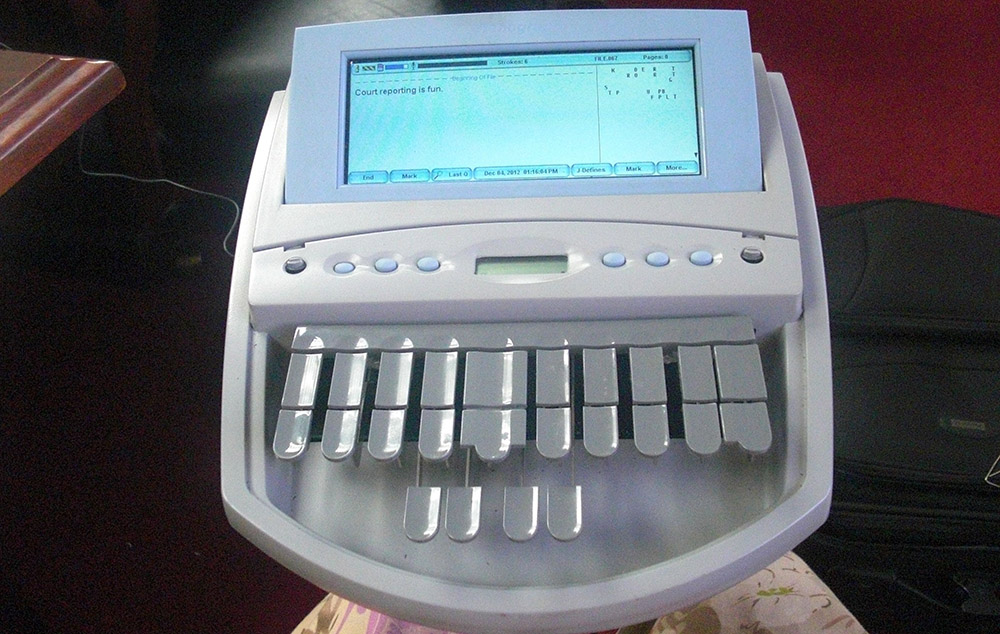Legal court reporting and the Evolution of AI Innovations
Legal court reporting and the Evolution of AI Innovations
Blog Article

The Future of Court Reporting: Advancements and Trends Shaping the Market
As you explore the future of court reporting, you'll see a change driven by modern technology and advancement. Real-time transcription and AI applications are reshaping how legal proceedings are recorded. With remote depositions getting traction, the landscape is progressing quickly. It questions concerning the duty of stenotype reporter and the skills they'll require moving ahead. What does this mean for specialists in the field? The answer could stun you.
The Influence of Expert System on Court Reporting
As fabricated knowledge continues to advance, it's improving the landscape of court reporting in methods you could not expect. AI can examine huge quantities of lawful text, assisting you identify appropriate criteria and improve instance preparation.
In addition, AI can improve the preparation procedure by supplying predictive analytics, which can help you expect trial outcomes based on historic data. This isn't just about changing tasks; it's regarding enhancing your abilities. With AI handling routine jobs, you can concentrate extra on your core responsibilities, such as ensuring precision and supplying crucial legal understandings. Welcoming these modifications can place you as a forward-thinking professional in a changing industry.
Real-Time Transcription: Enhancing Precision and Effectiveness
Real-time transcription has actually transformed the court reporting procedure, making it less complicated than ever before for you to catch precise records on the area. With advanced innovation, you can now give immediate transcripts during hearings or depositions, guaranteeing that all parties have access to important info right away. This immediacy not only improves the general efficiency of the legal procedure however also enables you to concentrate on the discussion, instead of clambering to catch up.
By accepting this technology, you're not just boosting your workflow; you're establishing a brand-new standard in court coverage that prioritizes precision and efficiency. This forward-thinking method placements you at the leading edge of the advancing legal landscape.
The Surge of Remote Depositions

With the growing demand for flexibility in lawful process, remote depositions have actually become a game-changer in court reporting. You can now participate in depositions from anywhere, removing traveling time and prices. This convenience allows you to focus on what absolutely matters-- preparing your instance.
Remote depositions make use of sophisticated modern technology, allowing real-time communication and file sharing. You can engage with witnesses and attorneys perfectly, ensuring that everyone remains connected regardless of their physical location. This technique not only saves time however likewise broadens your swimming pool of professional witnesses, as geographical barriers become less of an issue.
As remote depositions gain appeal, it's vital to adapt to this brand-new norm. Acquaint yourself with the necessary devices and methods to guarantee a smooth experience - court reporting. Accepting this development can give you a competitive side, enabling you to navigate the ever-evolving landscape of lawful procedures efficiently
Digital Courtrooms: Transforming the Legal Landscape
As you enter the globe of digital courts, you'll see just how online hearing technology is improving legal process. This change not just makes gain access to easier yet additionally boosts transcription accuracy, guaranteeing every word is recorded correctly. Welcoming these advancements can significantly boost the performance of the lawful procedure.
Digital Hearing Modern Technology
While the typical court room setting has actually long been an icon of justice, the increase of online hearing modern technology is reshaping exactly how legal process are carried out. In enhancement, digital hearings can boost participation, allowing witnesses and experts to provide statement without the constraints of location. As you adapt to these adjustments, you'll notice that online hearings preserve the honesty of the legal process while embracing innovation, inevitably changing the method justice is served in the modern-day globe.
Enhanced Transcription Accuracy
Enhanced transcription accuracy is reinventing the legal area, making court process much more dependable than ever before. With advancements in speech discover this info here recognition technology and AI-driven tools, you can expect to see a significant reduction in transcription mistakes. These technologies not just capture every word spoken but additionally represent subtleties in tone and context, boosting general understanding. Therefore, essential details aren't lost in translation, ensuring that the stability of the legal procedure is maintained. Furthermore, real-time transcription allows you to access exact documents immediately, promoting smoother interaction during trials. Accepting these technologies means you're tipping right into a future where quality and accuracy in lawful paperwork are extremely important, inevitably profiting all events associated with the judicial system.
The Role of Court Reporters in Virtual Hearings
Stenotype reporter play a vital function in virtual hearings, guaranteeing that every word spoken is accurately recorded and recorded in real-time. As a court press reporter, you promote communication in between celebrations, making complicated legal process accessible. Your experience in legal terms and the capability to rapidly look at this now adjust to numerous speakers are critical in this electronic environment.
During online hearings, you keep an unwavering focus, even among technological difficulties or distractions. You give a clear, written record that can be referenced later, assisting courts, attorneys, and clients understand the process. Your abilities in steering different systems ensure that you can effortlessly incorporate right into any kind of online setup.
Moreover, you likewise assist copyright the stability of the judicial procedure, verifying that every individual's voice is listened to. By doing this, you not just enhance the performance of legal proceedings yet additionally add to the general justness and openness of the justice system.
Advancements in Documentation and Record Maintaining
As technology develops, developments in documents and record maintaining are transforming how court reporters capture and take care of legal records. You'll locate that digital devices permit quicker and extra precise transcription, minimizing the possibilities of human error. Cloud-based storage services allow you to safely keep and gain access to documents from anywhere, making partnership with legal teams seamless.
Artificial intelligence is likewise playing a substantial duty, aiding with real-time transcription and even using smart modifying features. These developments not only improve performance but additionally assure that you can provide top notch documents in a hectic legal environment.
Additionally, the assimilation of voice acknowledgment software application streamlines the procedure, allowing you to focus extra on the subtleties of the process as opposed to simply typing. By embracing these technologies, you're placed to boost your skills and meet the demands of contemporary court reporting properly.
Future Abilities and Educating for Court Reporters
While modern technology reshapes the landscape of lawful procedures, it's crucial for court press reporters to adapt by acquiring new abilities and training. You'll need to acquaint yourself with sophisticated transcription software program and electronic reporting tools to stay affordable. Welcoming man-made intelligence and real-time captioning will certainly improve your effectiveness and precision.
In addition, creating strong research and logical abilities is crucial. You'll commonly encounter complex legal jargon and procedures, so comprehending legal concepts will develop your reporting. Online courses and workshops can give useful understandings right into these areas.
Networking with various other specialists will likewise assist you stay updated on market patterns. Joining organizations or attending seminars can reveal you to brand-new technologies and best methods.
Lastly, sharpening your interpersonal skills will certainly enhance communication with attorneys and customers. By concentrating on these areas, you'll position yourself for success learn the facts here now in the evolving area of court coverage.
Regularly Asked Concerns

What Credentials Are Required to Come To Be a Stenotype Reporter Today?
To end up being a court press reporter today, you'll require a senior high school diploma, specialized training in court coverage, and certification, frequently with a national test. Strong keying abilities and interest to detail are essential for success.
Exactly How Can Court Reporters Keep Updated With New Technologies?
To remain upgraded with brand-new innovations, you should participate in workshops, sign up with expert companies, and subscribe to appropriate magazines. Networking with peers and taking part in on-line discussion forums can also maintain you informed concerning the most recent improvements.
What Is the Average Salary for Court Reporters Currently?
The typical wage for court press reporters differs by location and experience, yet you can expect around $50,000 to $70,000 yearly. In some areas, experienced press reporters can earn a lot more, especially with specialized skills.
Exist Job Opportunities for Court Reporters in Non-Legal Area?
Yes, there are work possibilities for court reporters in non-legal areas. You can locate roles in shut captioning, transcription solutions, and media, where your skills in recording talked language are very valued and demanded.
Just How Does Court Coverage Differ in Numerous Countries?
Court reporting differs considerably across countries. You'll find distinctions in terms, modern technology, and legal systems. Some nations highlight electronic coverage, while others still rely on traditional stenography methods for catching spoken words.
Report this page